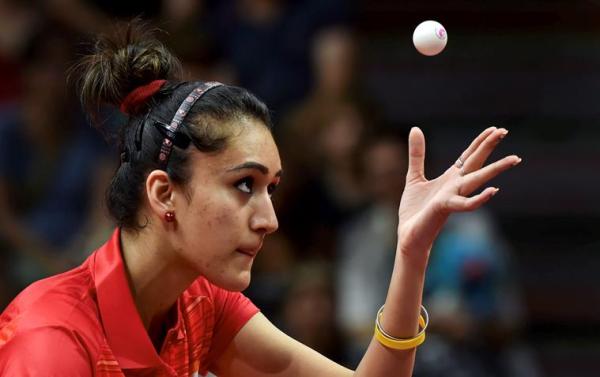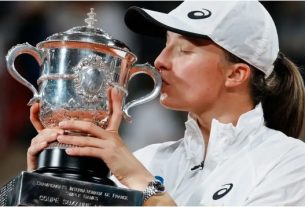The Indian women’s team, seeded 17th defied all odds when they stretched the fifth seeded Romania to the final rubber of the best-of-five tie, only for Manika Batra to stumble at the final hurdle. A few hours later, the fifth seeded Indian men’s team were unexpectedly beaten 3-1 by Slovenia.
Thank you for reading this post, don't forget to subscribe!Shared News| January 25, 2020 10:16:29 am
On paper, Manika Batra should have beaten the current world no 134 Daniela Monteiro Dodean. But her opponent was a former world no 19 who was getting back up the rankings.
Teammates jumping over advertisement boards, rushing onto the playing area to greet their compatriot, who already has hands raised up high in celebration. This is an image that has been associated with Indian table tennis quite often these last few years. It happened when both the men’s and women’s teams won gold at the Commonwealth Games, when the men’s team won bronze at the Asian Games, and when the men’s team finished in the top 15 at the World Championships in 2018.
It was an image that was, at least for the men’s team, expected to be repeated at the ITTF’s team Olympic qualification event in Gondomar, Portugal on Friday. But it wasn’t to be.
The Indian women’s team, seeded 17th defied all odds when they stretched fifth-seeded Romania to the final rubber of the best-of-five tie, only for Manika Batra to stumble at the final hurdle. A few hours later, the fifth-seeded Indian men’s team were unexpectedly beaten 3-1 by Slovenia.
Former Olympian Neha Aggarwal sums up the Indian challenge: “It was disappointing by the men, they should have done much better. But it was a heartening effort by the women.”
💫EMOTIONS ARE REAL rewind the #BestMoments of Day 3⃣
#Rise2Tokyo pic.twitter.com/7DYZypdg5v
— World Table Tennis (@WTTGlobal) January 25, 2020
There’s still a chance for both teams to qualify for the Tokyo 2020 Olympic Games later this year, as they move onto the second stage of the qualification tournament. But, at least for the men’s team, it should never have gone down this far.
Both teams needed to win two consecutive ties to make the Tokyo cut. The men’s team, ranked ninth in the world, made quick work of Luxembourg in the first round. Only Slovenia stood in the way of the Indians and a berth at the Olympics. And they had the players to win that tie as well.
India had the likes of the world no 30 and 33 Sathiyan Gnanasekaran and Achanta Sharath Kamal – both of whom have been instrumental in the rise of the Indian team – respectively in the ranks, while Slovenia’s highest-ranked player was world no 40 Darko Jorgic. And the Indian pair made a commanding start to the tie, winning the doubles rubber in three straight games. In the singles though, Sathiyan was blanked 3-0, Harmeet Desai lost 3-2 and Sharath went down 3-1 to hand Slovenia the Olympic spot.
IE Sports Podcast
“I’m not sure what went wrong with the men. They were a strong team and had trained very hard for this tournament, even holding camps in Chennai and Dusseldorf,” Aggarwal says. “It was probably nerves because apart from Sharath, the rest were all gunning for their first Olympics. But at the same time, if they want to be the best in the world, they will have to learn to embrace the pressure.”
The women’s team meanwhile played better than expected. Led by world no 61 Manika Batra, the Indians first came up with a win over 16th seed Sweden before putting up a strong challenge against the Romanians.

The women’s team will now take on France in the quarterfinal of the second stage of the tournament on Saturday.
After going down in the doubles, Batra pulled off a 3-1 win against world no 19 Bernadette Szocs. Sutirtha Mukherjee also beat Szocs in the fourth rubber to level the tie at 2-2 and take it to the decider.
In the fifth, Batra was to play the current world no 134 Daniela Monteiro Dodean. On paper, it was a match Batra should have won, but her opponent was a former world no 19 who was getting back up the rankings after being away from the tour on maternity leave.
“Daniela is from my batch. She’s a very tactical and smart player and that made the difference,” Aggarwal says. “She knew how to counter the long-pimple game Manika plays. So she kept playing inside-out forehands deep onto Manika’s backhand.”
Batra ended up losing the rubber 3-1, and the Indian women bowed out 3-2.
The women’s team will now take on France in the quarterfinal of the second stage of the tournament on Saturday. Meanwhile, the men will play the Czech Republic.



